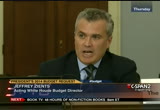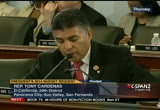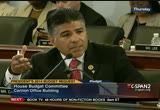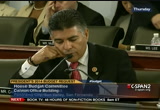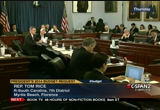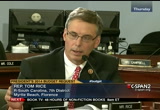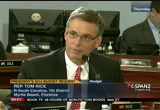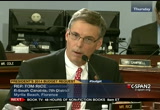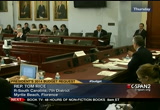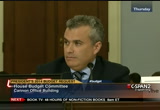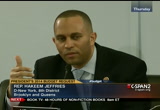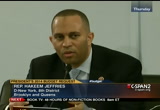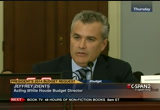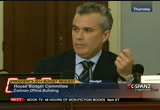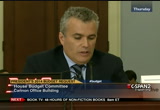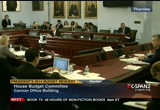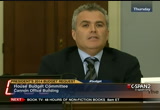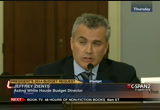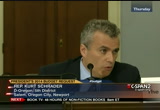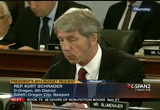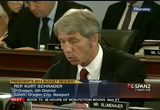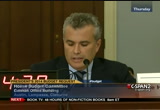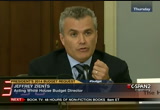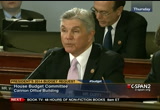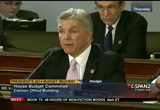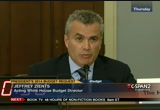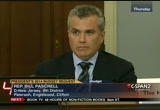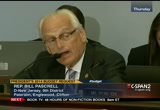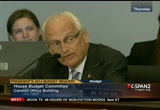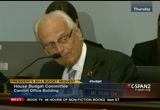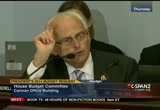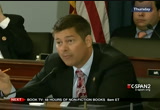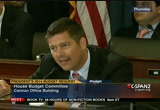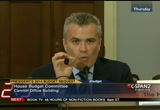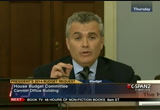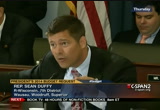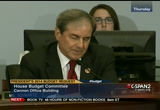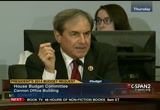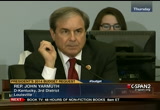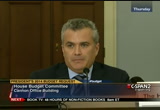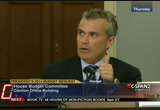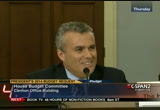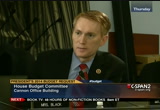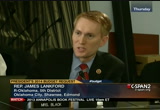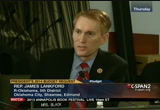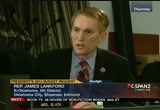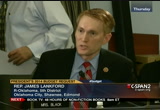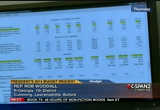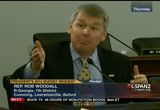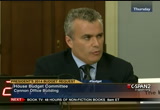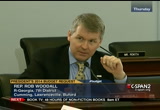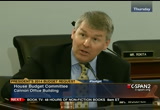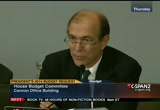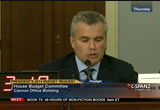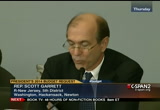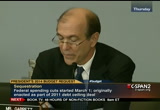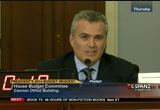tv C-SPAN2 Weekend CSPAN April 13, 2013 7:00am-8:00am EDT
7:00 am
will receive free k, it is fabulous, study after study shows positive impact of pre k education. >> and we will educate workforce. >> absolutely. >> the benefits are tremendous. as a former employer myself i agree with that. if you were to witness the legislative bodies on the budgets, you think that is a good thing? >> absolutely. to return to regular order. >> as former chairman of the budget conference in the state of california. it is part of the wonderful and you can process, and would do without that. and i hope we get back to that here. when it comes to infrastructure investment is it more cost-effective for us to fix our infrastructure now or put it off
7:01 am
until later? >> always better to do now. of particular moment in this particular moment, we have high unemployment, particularly among construction workers, an opportunity to put people back to work and then we start to get benefits from having improved infrastructure in terms of small, medium and large businesses serving not only consumers of this country but throughout the world. >> to my point on the infrastructure investment on top of what you just said which i agree with you are absolutely accurate is if we need to fix a bridge or a road today, we put it off to fix the same road or the same section of bridge there's no question is more expensive to do it later. >> absolutely. >> the benefit factors more expensive to put it off because as you point out business which
7:02 am
we all care about here gets less benefit and they tend to have to deal with that head serve. >> investment in infrastructure and back to work. >> i would like to thank if you could think the president on my have for the budget he put forward because i think the president's but unlike the republican strategy the republican budget seems to focus on deficit reduction and not on investing in creating more jobs and the president's budget focuses on educating our children and making sure we're strengthening our work force which as a result grow our economy going forward. the president's budget is brave enough to invest in our american children and american workers today rather than putting an offer or focusing exclusively on deficit reduction and the best way for us to get out of the deficit, the reduce the deficit
7:03 am
is to actually get back into making sure we are educating our work force, creating a work force of tomorrow that is better prepared to compete in world and to regain our position as the copper base of production on this planet so thank you very much. >> the gentleman's time has expired. gentleman from south carolina. >> thank you, mr. chairman for being here. i appreciate very much your willingness to come and put your life on the president's budget for us. i want to start, when i say balanced hymie revenues should be equal to expenses or expenses -- when you say balance we need to have a tax. >> when i say balance, spending cuts and revenue as a balanced approach. >> you mean --
7:04 am
>> not a tax rate that tax reform. >> taxpayers -- >> by closing loopholes. >> when listeners hear you say balance the need to think tax increase because that is what we're talking about. >> the right way to think of it is a balanced approach which is spending cuts. >> right where wrong way -- >> to review the record -- >> to your image two years ago the president, obamacare, achieved a tax increase most of which had fiscal hit beginning next year. a lot of those taxes hit what he calls middle-class families and everybody else. three months ago we had a tax increase under the fiscal cliff arrangement and now we sit here
7:05 am
with this budget which proposes a tax increase over the next ten years and you just said from minute ago that even under this proposal, we are not making entitlement programs sustainable but in fact we need to have another conversation after this tax increase gets done and i assume we are going to balance again and increase taxes to make our social programs sustainable, and i assume we are talking about doing that this year as well so we have the obamacare tax increase hit and the fiscal tax increases hit and talking more tax increases here and when we get to them there are entitlement programs and where we really need to start we have another conversation about more balances and tax increases and this is a mighty brought reaching balance for this year,
7:06 am
isn't it? i have been a tax lawyer for 25 years and never seen anything like this. this is not leadership. we need to have a long-term plan. we have got to stop this piecemeal, small bite, no long-term thought, have got to give businesses certainty, why it is limping along, nobody knows what the rules are or what the rules are going to be. but in this flannelly talking about for the death tax back where it was three years ago. we have got to have a long-term vision to some kind of agreement on that and we can't expect the economy will continue to live long and the employment will continue to lag and our competitors will continue to get
7:07 am
an advantage over us. one question. we have already had our credit rating decrease once because we have been unable to deal sufficiently with our debt problems and under your scenario our debt continues -- the deficits continue and the amount of our debt as a percentage of gdp remains at 90% throughout this ten year period. i promise you our friends around a world are watching us and the credit rating agencies are watching us. let's just assume the president did put this thing forward as the resolution and by some miracle it got past, what would that do to our credit rating. would be downgraded again? >> absolutely not. to 90% charge is not the right way to look that. the right way to look at it is -- >> you said percentage of gdp is the way you wanted to look at
7:08 am
it. >> that includes intergovernmental debt. i don't think that is the right way to look at it. the right way to look at the debt is held by the public. that is not 90%. point of the 2, and exact the with the credit agencies are looking for, what will potentially put our credit rating at risk is manufactured crisis. >> we are manufacturing them every three month. >> he will not negotiate around the debt ceiling. >> thank you for your testimony to date. on want to talk about the president's proposal but on the question of the death and how we arrived at this moment in time am i correct or is it fair to
7:09 am
say that the 2001 bush tax cut that was not paid for at the time by this congress come add to this country's debt burden? >> there were two wars that were not paid for and a prescription drug plan was not paid for. >> as a result of the collapse of the economy in 2008 we took a $22 trillion hit, by some object of estimates necessitating a substantial bailout by this congress by financial institutions and a similar package, both of which presumably also added to our debt burden. is that correct? as it relates to the forward-looking plan, that you articulated that 5 believe would total $4.3 trillion in deficit-reduction over the next, it does seem to be a
7:10 am
forward-looking plan, my suggestion to the contrary, what very peculiar situation as it relates to our recovery under the president's administration, six million private-sector jobs that have been created, corporate profits at a record high, the stock market near all-time highs, productivity of the american worker at an all-time high, certainly has increased, yet unemployment remains high, remains suddenly high. why is it that we have got some economic indicators that seem to suggest we are doing well but others that suggest we have always to go and how those the president's plan deal with the circumstance? >> we're making progress,
7:11 am
6.5 million jobs, 3-quarters gdp growth, but we need to do more. unemployment is stubbornly high, we need to make investments in infrastructure we talked about, education, r&d, it is important we put the country on a sustainable fiscal path so the president's plant is first and foremost about getting people back to work, insuring we may feel for of reinvestments, that our economy performs at its full potential, turn off the sequester as soon as possible. that is costing hundreds of thousands of jobs, we need to stop manufacturing these crises. when you meet ceos, small companies, large companies they are wary of the next thing because they don't know what will next come out of a washington. we need to deal with our fiscal situation, get something done, return to regular order and let
7:12 am
this economy work and let people work and america live of to its full potential. >> i commend the president for putting forth this budget as well as his efforts to in good faith i think present a plan that both sides might take issue with in different areas but is designed to create common ground. as it relates to this issue of manufactured crazies, is the problem that if our creditors conclude the we don't have the ability in the united states of america to manage our affairs in an orderly fashion that that loss of confidence at some point may result in an increase in the interest we are paying on our debts moving forward? >> picking up where it left off over here, talking about the downgrade, the downgrade happens because of the manufacturing crisis around debt ceiling. the president has been very clear we're not going to
7:13 am
negotiate around the debt ceiling and the debt ceiling needs to be increased to take care of spending that has already been taxed and we should not be manufacturing crises like the sequester, we should be turning the sequester off, making sure we don't lose hundreds of thousands of jobs, washington should return to regular order and that businesses and the american consumer have the confidence that washington is not going to manufacture a crisis. >> yield back the balance of my time. >> gentlelady from tennessee for five minute. >> thank you for being here. some of us like regular order and the rule of law. four quick questions. let me ask you first, section four 99 of title 49 p.m. u.s. code, sketches or really defines law-enforcement personnel as
7:14 am
individuals of a rise to to carry firearms with the police power of arrest and identifiable by appropriate markings of a 40 so with sequestration and the debt crisis in mind and you talked about sequestration a lot today should federal agencies spend federal funds on law-enforcement uniforms for federal employees that do not meet this definition in our law, yes or no? >> i don't know enough about the topic. >> do you believe that the federal agencies follow the law? >> absolutely the federal agencies are following the lot in how they're implementing the sequestered. >> are there spending cuts, spending practices consistent with federal law? >> we worked with agencies, agency leadership, the guiding principle is mission first. as agencies implement the
7:15 am
difficult sequester cuts they're putting their mission first and foremost. individual decisions are up to the agencies. the questions you have, we can direct that. >> okay. i know you have a consulting background so let me ask you this. based on your training, should they provide you with federal law enforcement even though you have no federal law enforcement training? >> i don't think i would do well in federal law enforcement. >> sounds good. airline industry. they have lost $50 billion and put third of their work force over the past decade, but looking at gsa, since 2007 their budget has increased 18% so that is a double-digit increase
7:16 am
despite the fact that in 2012, u.s. airlines and passengers paid agency $2.2 billion in taxes and fees, that was a 50% increase over what had been collected in 2002 so should tse receive increased funding when passenger traffic over the past decade has declined by thirty million passengers a year? >> csa provides invaluable service, as to specifics around the tee is a budget i would refer to secretary of fasano n --napolitano this >> i receive the budget on behalf of the house, and in january 11th letter you said you were going to have it done as soon as possible. 65 days and 45 minutes from the
7:17 am
deadline, 98 days later, do you consider that to be as soon as possible considering that the house has already done its budget, the senate has done theirs. >>, extremely detailed, different exercises in the budget exercise by design given what happened with the fiscal crisis, the fiscal cliff crisis at the end of the year and the sequestered, those had major impact on the budget process, i will assure you that the people at omb worked very hard to deliver the detailed budgets you received yesterday. >> as soon as possible. >> absolutely. >> they know they have to do this every single year. >> we do the budget every single year. and the fiscal cliff negotiation
7:18 am
-- >> we did a better job managing our funds. and the department of commerce we requested $8.6 billion in discretionary funding for fiscal year 14 and 26% increase since obama first took office. so knowing we have got these, difficult fiscal environment, and you are talking about the fiscal cliff issues and the difficulty of sequestration so why can't we support a simple 2% reduction? why is it you are always suggesting -- >> overall discretionary spending driven to the lowest level since the eisenhower administration. >> time has expired. >> i yield back. >> i appreciate it. thank you for being here, mr. zients, will be sorely missed, i would like to congratulate the
7:19 am
president for being the adults in the room. as i look at his budget, a purely democrat budget or purely republican budget, we have a budget that tries to bridge the gaps, something this country sorely needs. more specifically, does the president go after deficit reduction by doubling down on the domestic sequester like the republican budget does that will cost 750,000 jobs? >> the sequester was never intended to be implemented but so terrible it would force deficit reduction. the president's but it has more than enough deficit-reduction to replace the sequester, the sequester is hurting our growth by 1/2% gdp and will cost hundreds of thousands of jobs. >> does the president's -- attempt to reduce our deficit's
7:20 am
national deficit, cut programs or double student interest loan rates like the republican budget? >> the president has put forward a permanent fixture student loan programs. >> does the president tried to reduce the national deficit by block granting medicaid not adjusted for medical inflation for actual case load? >> the president does not believe in block granting medicaid and the republican budget also cuts medicaid by 1/3 resulting in twenty million people. >> and the effort out in oregon where we are actually doing an outcome based approach to medicaid reform, saying we were in reduce medicare inflation rates by 2%. >> i want to say in an earlier conversation, we ran out of time. the situation is supportive of waivers, demonstrations to improve medicaid like any health
7:21 am
system, but we do have to recognize the importance of medicaid for a vulnerable population. >> incentivizing the state like the president is doing as a smart way to get savings and make sure states have the flexibility like you indicated. does the president reduce national deficits by entertaining medicare reforms that rely on the voucher? it is a voucher program because if it quacks like a duck is a duck, the voucher program however you slice it shows two thirds of the cost to seniors that can afford being on fixed-income. >> the president budget has sensible reforms to medicare that maintains the program. >> isn't it true economists block deficits to actually be manageable given the state of the country's economy that abruptly balancing the budget in a short window like republicans actually as harmful to the recovery and cause problems and cuts jobs? >> we talked about europe before
7:22 am
and austerity budgets and bowles-simpson and others groups and across time as the economy recovers. >> in the real world colleagues, we need to compromise. we are actually going to have a budget deal at the end of the day and compromise and look to reach other's opinion and validate the fact -- we all have a different view of the world. moms and dads across the country have to figure out how to come to reasonable accommodation, business men and women come to the everyday. in the real world we need to get past these talking points. it is time for this adult conversation, deal with our rising health care costs and the fact we have an aging population that the burden on the revenue system we haven't seen in a long time. the president has laid down a reasonable compromise, nearly worked out to completion last summer. i hope the conversation picks up from here. we go to conference and cooler
7:23 am
heads prevail and folks in the know labeled group understand one another's problem, fix this country once and for all. it is not to save our country. >> wish to commend the gentleman from oregon for yielding back before he got to secretary clinton. mr. williams for five minute. >> imus small-business owner and still one of the business 41 years and i ran because i didn't think there were not a lot of people defending small business owners and fist testimony today i am glad i ran. issaquah esther was his problem and that is worth starting. backup couple questions. why does your budget not balance? >> our budget is the right fiscal path for this period of time. it supports jobs, the economy, at the same time bringing the
7:24 am
deficit under control. >> tax increases. as a business owner i can tell you tech increases, anyway you want to look at it why not tax the deficit across the board to create more revenue and have the private sector and small business growth? why should americans have one of the highest tax rates in the world where we are trying to be competitive? why should the highest tax rate be something we are happy with? >> the private sector i was in the private sector 22 years and much of that was in the clinton period of time. >> i want to ask you the question. >> 97% of businesses are not impacted by any of the president's tax reform proposals, 97% but corporations, the president does favor tax reform. tax reform vetting courages investment in this country like the tax credit where it is only
7:25 am
given lower -- >> lower taxes to compete? >> the president of forward tax reform where his target tax rate is 28% for corporations, 25% for manufacturers. the president is in favor of tax reform, getting rid of loopholes and expenditures that encourage companies -- >> might want to see the word to small-business owners and we are not getting it. they are scared to death. the next question is has any but the the president prepared ever had a vote of confidence or a vote of support? >> as we talk a bunch we are all excited about getting back to regular order. >> has he ever had a budget anybody supports? >> people supported the budget, yes. >> in the private sector you start talking private sector experiences. if you believe so much in this budget are you going to use that when you go into private sector and will you borrow more in your new business than you take in? >> to the bottom line, the
7:26 am
bottom line in this budget, a tiny path, at the same time we need to support -- >> are you going to deficit spend? i am losing money but i need more money. a you going to do that? >> i'm going to try to grow my business the way we need to grow this economy, create jobs, be competitive, make important deficits. >> what is the threshold of what the private sector can pay? >> i want to be clear there is no tax rate increase in the president's budget? know tech trading crise, there is tax reform. >> you are not doing a good job telling small-business owners that. >> 97% of small businesses under $250,000 in income. >> that want more than 50,000.
7:27 am
your situation is making it so people can -- now they're trying to 2497251. it is the bad situation. we talked about eliminating poverty. if you eliminate poverty by putting people to work with the private sector regulations are killing the private sector. 7.8% unemployment is the norm? that the new norm? 50% poverty the new norm? 18-year-olds to 64, that work one day a year is the new norm? 50% underemployment the new norm? 99 weeks of unemployment compensation the new norm? >> it is not. what we're trying to do in this budget is get people back to work and grow this economy. we made progress, 6.5 jobs created by the private sector, the last 37 months. thirteen% quarters, we have a lot have as. >> for simplicity here, after you say you had a new job
7:28 am
creation when unemployment has gone up from 2000, when this administration, you had job creation go up. >> those who planned women rated lower. >> i don't believe it is. >> 7.6%. >> thank you, yelled back. >> the gentleman from new jersey for five minute. >> thank you for your testimony. the lifeline is interesting, responses. i do know i am pretty positive, and the unemployment rate is too high than when the president raises his hand. am i correct? >> yes. >> okay. i think the president should be
7:29 am
applauded for his proposals to not only invest in science but his proposal to make sure that we award, reward those corporations and companies who want to bring jobs back to the united states of america. i am glad, that proposal which he made in the state of the union address last year and he repeated it this year. we are kidding ourselves if we think that any sort of a decrease in social security payments is a good idea. this program was intended to be just one of the ways in which people were insulated from poverty in their old age. tensions and savings have eroded dramatically. according to the social security administration, 51% of the
7:30 am
workforce has no pension coverage whatsoever, none. that number is going to increase and 34% of the work force has no savings set aside for retirement. i think we know that cannot keep up with costs and that is why the president, our president included a raise in the minimum wage and we can debate that but he is sensitive to the fact that wages are not keeping up to the increase in certain costs. cutting the benefits our seniors rely on is not how we should balance our budget or try to balance the budget. the average retired worker receiving $1,262 a month, that benefit is critical to the
7:31 am
livelihood or livelihood and among elderly beneficiaries, 74% of unmarried people rely on checks for either half or more of their income. that is a fact. i could cite many other facts. and why in god's name would we leave this budget in determinism we are going to hurt benefits to reduce this deficit. with the current economic difficulties facing seniors what specific protections will the budget include to ensure those seniors who rely primarily on social security benefits more and more do that every year. how will we protect these
7:32 am
seniors, you tell me? >> was included in a compromise package -- >> i heard you say that before. let's stop blaming the other side. >> it is important -- >> this is our budget. >> this is not a cut in benefits. >> it is a cut in benefits. >> it is not a cut in benefits. a decrease in the annual increase of inflation to a benefit. >> and -- >> the benefits on social security at the same level, the annual increase to change cpi which could result in a lower increase. >> it is very different from inflation for you. do you recognize that? >> let me go to the second important point. the president is only willing to do this if there is protection
7:33 am
for older beneficiaries so at age 76 there is a bump up equal to 5% of the benefit for seniors so there is an older beneficiary increase to protect older beneficiaries, bowles-simpson and other groups. >> another question. >> bid gentleman from wisconsin for five minute. >> good afternoon, mr. director. you were talking about c p i. when does social security go in solving? >> social security solvency through 2033. >> medicare solvency goes through 2020. >> i don't think so. with the president's budget, currently 23 per medicare. >> the president has 370.
7:34 am
>> it is 2023 per cbo's solvency for medicare. >> talking about that -- >> late into -- >> in your budget you are proposing a change to social security that is solvents ten years longer than medicare and would changes do you make in medicare, no structural changes really. you are cutting benefits to providers, doctors, hospitals and clinics but not structurally changing medicare. >> it doesn't justify social security in many programs, point number one. the president -- >> it doesn't involve -- >> does it affect medicare? >> the president's budget -- does it affect medicare? >> on a very small basis. >> why are you focusing on medicare? >> that is what i want to do. $70 billion in savings including increase premiums for high
7:35 am
income beneficiaries and save $1 trillion. >> that brings solvency to what year? >> 2020s. >> additional four years, right? >> late into the 2020s. >> if this is your proposal, these are our priorities, you have protected us either, haven't put out a plan besides cutting reimbursement that go to the benefits of our seniors. >> to your point extended medicare solvency and most importantly protected medicare we are not willing -- >> the gentleman wisconsin controls the time. >> to you care about fixing medicare and saving it? >> absolutely the save medicare as we know it. don't want to turn medicare into a voucher system. >> why don't you put out a plan that saves medicare? >> we do. >> no you don't.
7:36 am
>> we put forward a plan, $70 billion to extend solvency and over $1 trillion but most importantly it means medicare as we know it. >> you patch $1 trillion in reimbursements -- >> if the gentleman desires to speak instead of the witness please reclaim your time. >> you credit $1 trillion, $760 trillion in obamacare, $3 trillion in your budget and this still going to go broke. in 2027. do you have a plan that protect our seniors, not just current retirees but the next generation of retirees. do you have a plan that does that? >> we continue to make -- >> they have a plan? >> what we do is protect medicare -- >> i reclaim my time. they have a plan to save medicare? to save a long-term? >> the president's plan saves
7:37 am
medicare as we know it. >> i reclaim my time. in 2030 medicare under your plan? >> we will make reforms. >> in 23 is medicare solvent under your plan? yes or no? >> the president of this >> the answer is no. it is not all of. >> not the right way to look at the problem. >> is it the right way. >> i reclaim my time. i want to look at job growth and investment. this is an important part of growing our economy, putting people back to work, of people working brings more revenue in federal coffers, we all agree on that. i was reviewing the budget and no where in the budget that i see the president was going to support the keystone pipeline. 20,000 direct jobs, 1,000 indirect jobs, infrastructure spending. i don't see that. if you care about jobs, putting private-sector union back to work, why in this budget do you
7:38 am
care about jobs and infrastructure spending wire you supporting the keys and pipeline? >> these and pipeline decision in the state department creates a state department, i will point you to fifty billion dollars he needed investment in infrastructure traditionally a bipartisan -- >> you have $750 billion in the debt. that is $100 billion more than spending a new military. >> evelyn from kentucgentleman fraud five minutes. change of the time to respond to things you may not be able to respond to daring of the course of the morning. first thing i want to say is it is frustrating to me john boehner and leader mcconnell
7:39 am
talk about the fact that democrats for the obama administration got there tax hikes in january and that is it and they are asking for more, would not be fair to say by the same logic because of the sequester with the budget control act, $2 trillion worth of cuts that we have enacted over the last few years that the republicans got their cuts and yet they still ask for more cuts? >> if you look get the deficit reduction without a sequester the sequester was never intended to the policy, and $3 in spending cuts for every dollar of revenue. >> republicans have got lots of cuts and asked for more in their budget. i thought that was fair. spent a lot of time trying to distinguish between premium support and vouchers and structure of the republican
7:40 am
plan. i would just like to note that the difference between those characterizations, a lot smaller than the difference between calling what we did in the affordable care act allowing doctors to be paid for end of life decisions showing that death panel. i would say there was a lot of great distinction but that is just fine. just having fun. i want to say one other thing to clarify. when we talk about social security we are not necessarily talking about bankruptcy type of solvency of social security can continue to pay 100% -- >> then it becomes 75%. we will reform social security so that doesn't happen. >> just wanted to get that on a record. i want to offer the remainder of my time if you want to talk
7:41 am
about the levels that were brought up in the discussion that you were unable to respond to. >> because it is so important to emphasize the sequester we have heard from many of view in your constituencies with is going on and is impacting people across the country, going to cost a 1% gdp, hundreds of thousands of jobs at a time we need to be adding hundreds of thousands of jobs, i think it is really important, never intended to be implemented. for balance deficit reduction, that we immediately turn off the sequestered. >> i appreciate that. just the segway for a moment. there was some conversation earlier about this notion of
7:42 am
public expenditures and the private economy. i reviewed our appointment situation in the district in kentucky and seven of our largest nine private-sector employers rely to a significant extent on government spending and contract with the federal government to the hospital system to humana which realized a% of humana's businesses from the federal government. when we talk about these cuts in federal spending we are not just talking government bureaucrats paying the price, we're talking about a significant portion of the private economy. >> taking advantage of your generosity i want to make sure we never had an opportunity to comment on one chart that went up which showed gross debt which is not the right way, publicly
7:43 am
held debt is on a declining path in 2016, that is a clear milestone of fiscal sustainability. the second is on medicare solvency issue the president has done a lot to improve our situation about medicare costs for costs per-capita are growing less than gdp, cbo adjusted over $200 billion to reflect medicare on a per-capita basis in the president's term. >> the gentleman's time has expired. the public debt remains under the president's plan. >> gentleman from oklahoma recognized for five minute. >> thank you, mr. chairman for being here. you mentioned cigarette taxes and the increases, the dual purpose is bringing more revenue and decrease usage.
7:44 am
is that correct? >> public health benefits. >> the cigarette tax goes in place and decreases usage and also a proposal you have in the budget that basically remove an incentive, and $3 million and i are a. do you assume if people get $3 million they will stop putting money through an ira and invest in other areas and move away from that? >> a $3 million -- >> yes or no, do people add to that? >> the advantage to the three million level. >> people will stop putting into an i r a as much at that point and invest in other areas because they don't have tax advantage? >> the than the one alternative investments are. >> they probably will. the cigarette tax --
7:45 am
>> to be clear -- cigarette tax will probably decrease use of cigarettes and if you remove the tax benefits, they will probably decrease. the question is there are significant portions that say they will remove all the normal business expense for traditional energy production so all of those normal business expenses will go away. do you think we will have more or less energy production if we remove a normal business expenses? >> i think we had a big increase. i think we will continue to have an increase particularly in natural-gas. >> you will be the opposite effect. right now the lowest drilling in natural gas since 1999. >> it is a record high. >> the business expense deals with the production, are you aware of that? when we talk about adding new inventory do you think we will
7:46 am
increase inventory if we raise taxes on energy production? >> we need to have all of the above energy strategy. >> encouraging renewable energy, solar? >> you are answering a question i am not asking. they you think we will increase production by increasing the tax burden on traditional energy produced? >> we will have appropriate alignments with energy strategies. consistent alternative and a fair tax code. the president does extend -- >> let me reclaim my time. the green book, the treasury, the details use the term they want a neutral system and if you remove all the tax incentives for traditional energy production, oil and natural gas and move it to a neutral position is that the president's
7:47 am
position that we should be neutral and energy? >> the alternative forms of energy we should be encouraging efficiency and also be encouraging domestic gap in oil production. >> no problem encouraging efficiency and all kinds of ways but if we are neutral it is interesting to me. one of the book talks about how oil and natural gas if we go to this one talk about oil and natural gas will be energy for the future because what we are producing, we have to transition at some point to that. go to a different page and it says we will decrease usage of oil and natural gas and if we go to the treasury, it says we are neutral and it is interesting figuring out the tax policy and energy policy where we are headed. if you raise taxes and remove normal business spending it will decrease production. my question is is there another industry the president wants to
7:48 am
remove normal business expense from? >> the president wants to get rid of tax expenditures and loopholes that encourage companies to move overseas. >> i would agree with that but is unwilling to do it here. am i correct on that? the territorial tax system doesn't seem to be addressed? >> you have secretary louis at some point. don't think of as territorial and global. the president put forward principles for corporate tax reform, lower rate for manufacturing and having a global minimum tax which is a hybrid system. >> of all the business expenses for energy production is taken away, i assume we incentivize if we go to other forms of energy, the reality is the middle class will pay more for energy and that will be a middle-class tax shifted to a different area. >> gentleman's time is expired.
7:49 am
gentleman from georgia. >> thank you, mr. chairman. if i could ask, if feels less we're having a hearing and will like sitting around a bitter table together. i don't know -- >>, have a paper copy? >> i am not going to go deep into the weeds. i was going to take a back two hours and recommend a good ophthalmologist to spot, lazy solve my woes. the gentleman from maryland, you were talking about fundamental tax reform and whether we have seen any proposals to bring rates down 25% for high income earners without raising of the burden on middle and lower-income americans and i will refer you to report they are doing an update, numbers on the board but what they show is the affected in income-tax rates for folks, not 1%, affected income tax rates, people earning
7:50 am
$1.7 million a year is 19%. down to the top-10%, folks averaging $366,000 a year or more, the effective income-tax rate is 16%. i have been here two years and it surprises me how we argue about recidivism all the time. of the effective income tax rate today is 16% and what we would like to do through fundamental tax reform is lower marginal rates. >> give me a sense of the tax expenditures you would get rid of. >> i would say to the gentleman, that is the hard conversation but to say it is not doable, can't be done without raising taxes on middle-income americans it can't be done without restricting tax breaks for upper-income americans which is something the president has been very comfortable promoting.
7:51 am
>> getting rid of -- absolutely. to say it can't be done, we disagree about the way it can be done but let's not say it can't be done. that is where i want to spend the rest of my time. >> you are right to point out of frustration all-america has with bring some in japan last-minute dealmaking that characterize the fiscal cliff, and everything else we do. yet look down the road two decades away before the time that i retire, there is no need to work on social security yet because that is how far away even on medicare. and push solvency -- >> you mischaracterized what i said. we put forward basic principles for social security reform. it is naughty near-term fiscal situation. at the same time the president is willing and like to get the
7:52 am
situation behind us. >> let me -- we are kicking the can down the road, i didn't see a word of the president's budget, about doing anything to extend the solvency of social security. did i miss an idea you had? >> it is not fall through 2033. not a driver of the near-term -- >> to stipulate that, a single idea for solving social security shortfall long-term. >> i am disappointed about that. and what about the social security trust fund? do you know when that trust fund exhausts its resources? >> i believe it is 2016. one i see 2033 is a combination -- >> social security disability
7:53 am
trust funds in 2016 is calendar year 2015, we begin the president's term, i know we have one in ten americans who depend on that program under social security trust fund, that trust fund will exhaust its resources and benefit cuts will occur or we will have to begin borrowing from general social security trust fund speeding its demise and there is not one idea in the president's budget, maybe you are right that we can wait 20 years but what is the one idea? >> continuing disability reviews which have a $9 to $1 return with program integrity to ensure people who are on disability remain on disability. >> and that extended disability trust fund from 26 in to when? >> i don't have that calculation. we should fund that immediately. >> or stipulate -- kicking the can down the road is that no matter who's doing it.
7:54 am
we get around a kitchen table and all those issues more often. >> gentleman's time has expired. mr. garrett for five minutes. >> we will not agree 100% on these things. can we agree there may be something we agree on and that is those things we should focus on. one of the things i heard when i came into the room is there are no new taxes in the budget. did i hear that correctly? i heard that at that time. >> $580 billion is part of the $1.8 billion compromise, all of that is key through tax reform, not through raising rates and john boehner said there were $800 billion tax reform. >> that meets the president's pledge early on and your interpretation never to raise taxes on anybody who makes over $200,000. the president's pledge was never
7:55 am
to raise taxes on anyone who makes less than $200,000. >> they make 200,000 and individuals -- >> kept that pledge in regard to this budget and with regard to the boat we had at the end of last year, the fiscal cliff issue so the president has always kept that promise. even when we pass the affordable health care act he kept the promise as well. we have never raise taxes on the american public to make them to $60,000 so the supreme court across the street was incorrect when a call the affordable health care act health care act a tax increase because you still take the position and the white house takes the position that that was not a tax. >> that is a choice and individual makes -- to can afford -- >> it is not a tax. >> individual responsibility. >> you are confirming -- >> i am not -- what i'm telling you is those individuals --
7:56 am
>> it is a tax or not a tax? last year you said was not a tax. as your opinion change? >> it is an individual responsibility. >> yes or no? >> it is an individual responsibility. >> april 15th and individual responsibility? >> it is an individual responsibility. >> one of the article fifteenth -- >> the supreme court on technical definition. i'm not a lawyer on the first amendment. >> i take that that you don't know what tax is and the white house doesn't know what the taxes. >> when those individuals who can afford health care does purchase health care they are transferring costs to everything else. >> i reclaim my time. one of walked into the room you said the sequester was a terrible policy. i understand the press secretary speaking for the president's said the sequester was the white house's proposal. my question to you is is there anything else in the budget that is before us that is also a terrible policy? >> let me clarify what i meant.
7:57 am
the sequester was not a policy that was meant to be implemented. as a policy being implemented is a terrible policy. >> other times the president has given us terrible policies as suggestions to congress? >> i don't know what you are referring to. i want to make clear -- >> you thought of a terrible policy. >> please. i said the sequester was a forcing function implementing the sequester and across the board in discriminant cut. >> reclaiming my time. >> terrible policy. >> reclaiming my time. the sequester was terrible policy. beyond that we are operating under the 1974 budget act. is that correct? the procedure we go through? >> yes. >> under that law a president is required and was required to present the budget to a sweet to months ago, correct? the answer is?
7:58 am
>> the answer is the budget is here today. >> we can't get straight answers. does not the law require the president submits -- >> the reason for the delay in -- >> reclaiming my time. does the law required him to present a budget two months ago yes or no? >> the budget is here today. >> it is a simple question. does the law requires it? if you do not know what the law is we will come back another time with you can get briefed on what the law is. of the law required the president is that the budget over ten months ago yes or no? >> the president's budget is here today. >> mr. chairman, i would suggest we do recall this witness at a time he can go back to answer simple questions as to what the law is. do you know what the law is? do you know what the law is, sir? >> record will demonstrate with this has not answered the question. >> i recommend we recall this witness when he has an opportunity to refer back the they >> just for the record the
7:59 am
witness did answer the question. you may not like the answer. >> i was asking if he knows what the law is. he did not give an answer to that. the president has violated that law last four of five years and i request we recall this witness when he can be brief not only on this law and many other laws. >> consideration with the chairman. i want to thank the witness for being with us for nearly three hours. i wish you godspeed in your future? 6:00 p.m. friday, april 12th, question for the witness. acting director zients, the answers will be entered into the record of this hearing, at this point a hearing is adjourned. >> thank you. [inaudible conversations]
104 Views
IN COLLECTIONS
CSPAN2 Television Archive
Television Archive  Television Archive News Search Service
Television Archive News Search Service 
Uploaded by TV Archive on

 Live Music Archive
Live Music Archive Librivox Free Audio
Librivox Free Audio Metropolitan Museum
Metropolitan Museum Cleveland Museum of Art
Cleveland Museum of Art Internet Arcade
Internet Arcade Console Living Room
Console Living Room Books to Borrow
Books to Borrow Open Library
Open Library TV News
TV News Understanding 9/11
Understanding 9/11